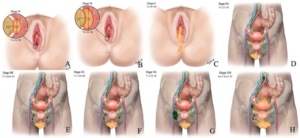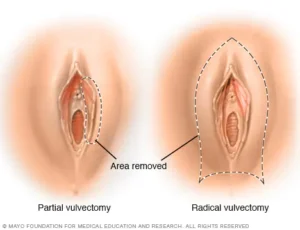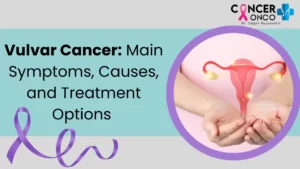Vulvar Cancer: Introduction
Carcinomas of the vulva and vagina are some of the most uncommon but this rare malignancy of Vulvar Cancer can change the life of females. Here in this blog, we tend to discuss Vulvar cancer diagnosis, symptoms, stages, and treatment options.
Vulvar Cancer accounts for less than one percent of all cancers in women.
- Women between the age of 55 and 75 years old usually get affected and is associated with irritant conditions such as Lichen Sclerosus Et Atrophicus.
- If a young age group in the 30s get affected by Vulvar cancer– it is associated with human papillomavirus (HPV) infection and smoking.
What all directions of investigations help to confirm this diagnosis?
Vulvar cancers u aresually present as a raised lump or ulcerated area.
Biopsy And Lesion
Keyes punch biopsy or a small wedge biopsy, including adjacent normal skin, is performed. (Excising the entire lesion may compromise the patient’s care, either by making the site of the lesion difficult to detect due to superior healing of the area or limiting the use of sentinel groin node detection. This is especially true of the smaller lesions).
Cytological investigation
As vulvar carcinoma is often associated with cervical carcinoma (10%), cervical cytology should also be performed at diagnosis.
Signs and symptoms of Vulvar cancer:
A symptom is something that only the person experiencing it can identify and describe, such as fatigue, nausea, or pain. Whereas, A sign is something that other people can identify and measure, such as a fever, rash, or an elevated pulse. Together, signs and symptoms can help describe a medical problem. Sometimes, people with vulvar cancer do not have any of the signs and symptoms described below. Or, the cause of a symptom or sign may be a medical condition that is not cancer.
People with vulvar cancer may experience the following symptoms or signs.
- A B in or on the vulvar area or groin (an enlarged lymph node)
- A patch of skin that is differently textured or colored than the rest of the vulvar area
- Persistent itching, pain, soreness, or burning in the vulvar area
- Painful urination
- Bleeding or discharge that is not menstrual blood
- An ulcer, open wound, or cut that persists for more than 1 month
- A change in the appearance of an existing mole (this symptom is for vulvar melanoma specifically)
- Wart-like growths that are similar to genital warts
Management Of vulvar carcinoma
Surgery remains the key to localized disease.
The risk of groin node metastases is related to the depth of invasion so usually, the ipsilateral nodal group is at risk hence needs to be assessed. If the groin nodes are negative then the survival rate is very high. The number of positive groin nodes remains the single most important prognostic factor. Adjuvant radiotherapy to the groin and pelvic nodes is utilized with more than two positive nodes.
This is the most common question that hitches the throat
Certain types of vulvar cancer surgery can result in the removal of organs needed for pregnancy, and certain treatments might change hormone levels or cause damage to a female’s eggs. These effects result in some females losing their fertility during treatment which can be either temporary or permanent. Don’t assume your doctor or nurse will ask you if fertility is important to you. They don’t always remember to bring this up, so you might have to bring it up yourself.
If you are considering taking steps to preserve your fertility, and it’s possible to do so, be sure that you understand the risks and chances of success of any fertility option you are interested in, and keep in mind that no method works 100% of the time.
This involves fertility preservation.
For details Contact Dr. Sajjan!
This is advised to not let fear, embarrassment, or shame prevent you from finding the help you need in case of vulvar cancer. You are not alone!” this is for all females as you know your body better than anyone. If there are any changes, get it checked out. I think like a doctor it would rather be better to be embarrassed and alive than modest and dead as you take care of your family you are the strongest pillar.
Stages of Vulvar cancer (Vulvar cancer staging)

Once vulvar cancer is diagnosed, it is categorized by its stage, which means by how far it has spread.
There are four main stages:
Stage I:
In this stage, cancer is only present on the vulva or perineum (area between the rectum and the vagina).
Stage I is divided into two stages, IA and IB which are based on the size of the tumor (less or greater than two centimeters [peanut size]) and spread into the tissue (less or more than one millimeter [tip of a pencil]).
Stage II:
In this stage, the tumor (of any size) has spread into the lower part of the urethra, the lower part of the vagina or the anus. Cancer has not spread to the lymph nodes.
Stage III:
In this stage, cancer has spread to one or more nearby lymph nodes.
Stage III is further divided into stages IIIA, IIIB, and IIIC based on the number and size of the lymph nodes involved.
Stage IV:
In this stage, cancer has spread into the upper part of the urethra, the upper part of the vagina, or other parts of the body.
Stage IV is divided into stages IVA and IVB based on if the spread is localized near the vulva or spread distantly
How is vulvar cancer treated?
There are four vulvar cancer treatment options. Factors that will help guide your healthcare provider’s choice include:
- The stage of your cancer.
- Your age and general health.
- Whether cancer has just been diagnosed or has recurred (come back).
Your healthcare provider will discuss exactly which type of treatment and order of treatment is best suited for the stage of vulvar cancer you are under.
Vulvar cancer treatment options:

1. Surgery
Surgery is the most common vulvar cancer treatment and its goal is to remove all cancer without any loss of your sexual function.
Types of surgery include:
- Laser surgery: This surgery uses a laser beam to make bloodless cuts in tissue or to remove cancerous surface lesions.
- Local excision: This surgery removes cancer and a small-to-large amount of normal tissue around the cancer. Sometimes nearby lymph nodes are removed.
- Vulvectomy: This surgical procedure removes part or all of the vulva and possibly some nearby lymph nodes. Skin grafts may be used to replace removed skin.
- Pelvic exenteration: In this surgery, your lower colon, rectum, bladder, cervix, vagina, ovaries, and nearby lymph nodes are removed. Artificial openings are created to allow urine and stool to flow from your body into a collection bag.
Surgery may be followed by chemotherapy or radiation therapy to kill any remaining cancer cells. Sometimes radiation or chemotherapy is recommended prior to or instead of surgery.
2. Radiation therapy
Radiation therapy kills cancer cells using high-energy x-rays or other types of radiation.
- External radiation therapy uses a machine to deliver radiation through your skin to the targeted cancer site.
- Internal radiation therapy uses a radioactive substance sealed in needles, seeds, wires, or catheters that are placed directly into or near cancer.
The choice of radiation therapy delivery method depends on the type and stage of the cancer being treated.
3. Chemotherapy
Chemotherapy is a cancer-killing medication.
- When taken by mouth, or injected into a vein or muscle, the chemotherapy can attack cancers throughout your body.
- When chemotherapy is placed directly into the spinal column, in an organ or a body cavity such as the abdomen, or applied directly to the skin in a cream or lotion the chemotherapy attacks cancer more locally – in those specific areas.
The type of chemotherapy given depends on the stage and type of cancer.
4. Biologic therapy
Biologic therapy is a type of treatment that uses lab-made substances or substances in your body to help your body’s immune system or fight cancer. Imiquimod cream (Aldara®, Zyclara®) is an example of a biological therapy used to treat precancerous vulvar lesions.
Recommendations for you:
Basal Cell Carcinoma Cancer Symptoms, Causes, and Diagnosis




